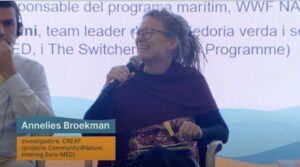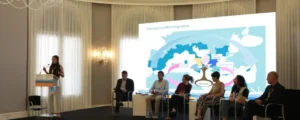Celebrating Three Decades of Euro-Mediterranean Cooperation
This year marked the 30th anniversary of the Barcelona Process, an initiative launched in 1995 to foster cooperation between Europe and the Mediterranean. Considering this milestone, the European Commission prepared to introduce the New Pact for the Mediterranean, which was to serve as the primary political instrument for deepening strategic cooperation with partners in the southern and eastern Mediterranean regions.
MedCat Days and ‘EU Investments in Strategic Projects’ Event: A Platform for Dialogue and Future Vision
This significant event was organised by the Generalitat de Catalunya, the European Mediterranean Institute and the Representatives of the European Commission in Barcelona and was held on July 9th at the Palau de Pedralbes (Barcelona). It focused on the Mediterranean’s evolving geopolitical, social, and environmental challenges and highlighted Catalonia’s crucial role in addressing these issues. CREAF, as a Project Partner of the Interreg EuroMed Project, was invited to generate synergies and talk about the four key missions: strengthening a sustainable and innovative economy, protecting and restoring natural heritage, promoting green and livable areas, and fostering sustainable tourism. Overall, the event served as a comprehensive platform for reflection, dialogue, and increasing visibility. It brought together various stakeholders, institutional actors, and strategic projects to collectively assess the region’s prospects, especially within the European Union’s new political cycle.
Thematic Roundtables for an Inclusive Future
The session aimed to foster a renewed and inclusive vision for Euro-Mediterranean cooperation through a series of thematic roundtables, which included discussions on:
- Catalonia’s Role in Investment and Innovation: Exploring Catalonia’s contributions to Mediterranean investment and innovation.
- Transforming the Mediterranean: Focusing on smart, green solutions achieved through territorial cooperation and community empowerment.
- Budget and Governance: Discussing new funding methods for future priorities in the Mediterranean.
- Charting a Common Course: Adopting a multi-stakeholder approach to tackle the challenges in the Mediterranean.
This event proved to be a pivotal moment for advancing Euro-Mediterranean cooperation, setting the stage for future
initiatives and strengthening regional partnerships.
Roundtable 2: Transforming the Mediterranean
The NHM participated in the dynamic discussion at Roundtable 2, ‘Transforming the Mediterranean: Smart, Green Solutions through Territorial Cooperation and Community Empowerment,’ as part of ‘The Barcelona Process, 30 years on: a Multi-stakeholders Outlook from Catalonia.’
Key Approaches and Initiatives for a Transformed Mediterranean
- Multi-level Governance and Synergy : A core principle is that regions possess inherent wisdom due to their diverse actors, whose knowledge, perspectives, and
competencies are vital for co-designing and rethinking the desired future. Multi-level and multi-actor governance is crucial for amplifying the impact of cooperation and continuously seeking synergies with other initiatives.
- Transformative Innovation Policy (TIP) : A significant focus was placed on the Transformative Innovation Policy (TIP) framework, which guides the approach to complex societal challenges. This framework considers global trends, dominant systems (e.g., science, technology, markets, governance), and niche innovations that offer sustainable alternatives. The interaction between these levels creates opportunities for systemic change.
- Catalonia’s Leadership : Catalonia plays a proactive role, implementing a multi-level perspective and TIP framework through its Smart Specialisation Strategy
(RIS3CAT), which involves fostering shared agendas and multi-level governance spaces where diverse actors collaborate on territorial challenges, sharing a common direction and methodology to advance towards a shared future vision. Catalan-led governance projects play a crucial role in providing regional governments with
information and expertise on key Mediterranean issues.
- Local and Regional Engagement : The importance of strong links and dialogue with multi-level political representatives was emphasised to ensure the transfer of
effective practices from local and regional actors, thereby enabling scalability. Public administrations can directly benefit from territorial cooperation projects by leveraging concrete examples and solutions.
Addressing Specific Challenges and Solutions
- Sustainable Tourism : Josep Rodríguez from the Barcelona Provincial Council discussed how the sustainable tourism mission addresses policy priorities and the
role of regional administration in Interreg Euro-MED projects. The aim is to dynamise and integrate various agents beyond thematic projects.
- Innovative and Sustainable Economy : Chaimae Essousi from the Generalitat de Catalunya emphasised the need for a transformative innovation policy approach to address complex, systemic challenges in the Mediterranean by generating shared frameworks, finding synergies with local innovation ecosystems, and proactively guiding innovation towards systemic changes. The Mission implements nine Transformative Innovation Policy Labs (TIPLabs) to connect the transnational Mediterranean dimension with local realities, fostering in-depth reflection, multi-stakeholder alliances, and co-created transformative solutions.
- Natural Heritage and Climate Change Adaptation: Annelies Broekman from CREAF highlighted efforts to promote scientific knowledge in governance strategies for climate change adaptation in the Mediterranean. Examples include the LocAll4Flood project, which reduces the impacts of sudden floods and provides early warning systems, and the MPA4Change project, which integrates climate risks into marine protected area management plans. The Natural Heritage
Mission supports the transfer of project results to inform policy at various levels, from local municipalities to international networks, with a focus on delivering evidence-based political messages. A key message from the NHM is the concept of ‘passive restoration,’ which allows ecosystems to recover by reducing pressures and emphasising non-degradation over restoration.
- Transnational Cooperation and Community Empowerment : Mehdi Aissi from WWF North Africa provided a strategic vision on how Interreg Euro-MED, particularly the Mission Nature, contributes to the entire Mediterranean basin, emphasising broader impact beyond direct beneficiaries, knowledge exchange, and partnership opportunities. The engagement of local communities is seen as highly beneficial.
Moving Forward
The roundtable emphasised the importance of regular meetings to promote dialogue and knowledge exchange. Catalonia’s potential to enhance its leadership role in the Mediterranean was recognised, with a call to amplify and empower knowledge across the region. The New Pact for the Mediterranean offers an opportunity to strengthen existing alliances and collaborations. The event concluded with a strong message to utilise transnational cooperation projects as essential tools for achieving a more sustainable and transformative future.


Photo Credit: CREAF and MedCities

